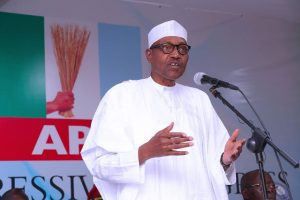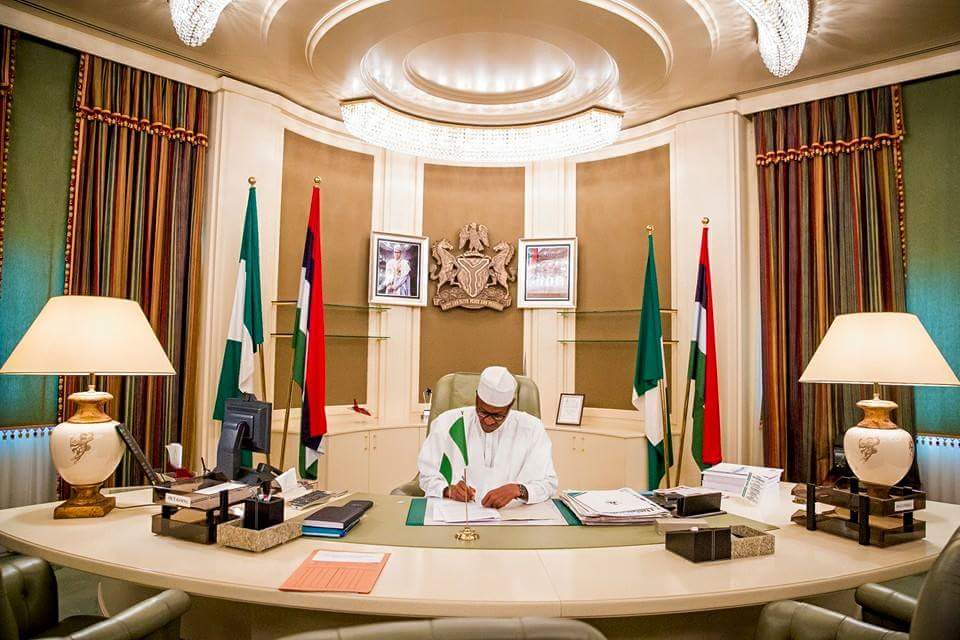By Adagbo ONOJA
He had been a problem for the establishment. He remained the non-conformist within, for which he was loved by so many but disliked by equally very many others who simply saw and still see him as a divisive personality. By 2011, he had been neutralized, blocked and caged. Then, by the curious stratagem for leadership recruitment in Nigeria, he was fished out and cleared for ultimate leadership again in 2015. Four years after, the result is a hotly contested meal. While his cult following has grown by millions and to the point that some of the most informed Nigerians, including radical activists and even Socialists, are rolling up the sleeves for him, his mystique has also become a question. That question is, what exactly did Muhammadu Buhari ever believe in?
The question is warranted by what is observable on the ground after four full years of him running Nigeria. It was unthinkable that Muhammadu Buhari would be democratically elected president of Nigeria and nobody can see systemic, massive welfare projects, state farms, comprehensive reform of key state institutions such as the para-military institutions, education, health care delivery, agriculture and the primacy of rule of law. Where anyone sees any elements of these, they are incoherent responses because President Muhammadu Buhari did not arrive Abuja with any document that has any constituted sense of Nigeria. All he came with were hotchpotch ideas built on bitterness from his skirmishes with those he competed for space and power in the military.
 Somehow, he must be congratulated, not for winning the 2019 poll but for the ability to cultivate that image and attract even people who though not his converts could, nevertheless, perceive that he had a sense of challenge about the Nigerian condition. They could perceive that sense because, just like Murtala Mohammed and Olusegun Obasanjo too, he was/is also a product of a one liner. While Murtala was constituted by the unforgettable ‘Africa Has Come of Age’ statement and Obasanjo by the ‘SAP must have human face’ standpoint, Buhari also said something about the IMF/World Bank as affronts on the dignity of Nigerians with their conditionalities. Then he also adopted the minority report by the late Mahmud Modibbo Tukur which canvassed for commercialization as opposed to privatisation in 1994. These were enough signals from a military Head of State who did these even as as product of the authoritarian temperament. He was certainly someone to be preferred to the other mindless soldiers of fortune. Most student activists of that generation, 1982-1994 found something to admire in a Buhari even as they detested his punitive practice of power.
Somehow, he must be congratulated, not for winning the 2019 poll but for the ability to cultivate that image and attract even people who though not his converts could, nevertheless, perceive that he had a sense of challenge about the Nigerian condition. They could perceive that sense because, just like Murtala Mohammed and Olusegun Obasanjo too, he was/is also a product of a one liner. While Murtala was constituted by the unforgettable ‘Africa Has Come of Age’ statement and Obasanjo by the ‘SAP must have human face’ standpoint, Buhari also said something about the IMF/World Bank as affronts on the dignity of Nigerians with their conditionalities. Then he also adopted the minority report by the late Mahmud Modibbo Tukur which canvassed for commercialization as opposed to privatisation in 1994. These were enough signals from a military Head of State who did these even as as product of the authoritarian temperament. He was certainly someone to be preferred to the other mindless soldiers of fortune. Most student activists of that generation, 1982-1994 found something to admire in a Buhari even as they detested his punitive practice of power.
Although, he began to be associated with controversial statements below his social and political stature as a former Head of State in the aftermath of his entry into partisan politics, some of them were understandable and excusable in the context of what he must have been going through. In spite of such statements and how they diminished his standing, he was still admirable, with particular reference to his statist potentials.
Some people operationalised their preference for that potential dangerously. In the Government House, Dutse, in Jigawa State between 2007 and 2011, anyone could have easily sustained a claim of a Buhari agent against some of us if one’s principal hadn’t known one very well. This was given the manner we needled him to, as also a potential leader, not only stop criticizing Buhari but rework the relationship. And there was progress in that regard. Who could have ever imagined that what the world has seen in the past four years is all that Buhari is capable of offering? That Buhari would run a government in which when criticized, his defenders would have nothing better than say, ah, but that is what Obasanjo government did. So, Obasanjo is the permanent benchmark, even outside of the time and space context of his own regime? And even then, for all this attitude of bringing an example from the past, Obasanjo has been more statist than Buhari. Obasanjo carried out a very shoddy privatisation exercise. There is no doubt about that. But even in doing that, he never crossed certain red lines. In fact, a labour intellectual perfectly captured Obasanjo’s ideological crisis by noting his swing between privatisation and residual statism. And he canvassed a certain contextually acceptable paradigm and practice of getting capitalism right although his propagandists never successfully communicated this. Nothing here is said as a defence of Obasanjo’s overall score or specific claims against him. Rather, what is at stake is the mandate of the intellectual to speak to nuances when others are spreading generalizations.
 Buhari’s coming in 2015 had its excitement. It was thought that there was a consensus to bring him to rein in the elite who were simply drowning the country in collective mindlessness. It was also thought that he was re-invented to provide a rallying point for the elite given the presence of the leaders of the legacy parties in the APC. That was considered good for the country because elite disarray is always risky. Can anyone see what Buhari has done to the APC in four years? And he and his ideologues are celebrating how certain fractions of the party have been vanquished when they should be announcing how many more fractional and/or tendency leaders they have attracted to the party. How can anyone talk about democracy without an organic party? What is organic about the APC today?
Buhari’s coming in 2015 had its excitement. It was thought that there was a consensus to bring him to rein in the elite who were simply drowning the country in collective mindlessness. It was also thought that he was re-invented to provide a rallying point for the elite given the presence of the leaders of the legacy parties in the APC. That was considered good for the country because elite disarray is always risky. Can anyone see what Buhari has done to the APC in four years? And he and his ideologues are celebrating how certain fractions of the party have been vanquished when they should be announcing how many more fractional and/or tendency leaders they have attracted to the party. How can anyone talk about democracy without an organic party? What is organic about the APC today?
The country has been on autopilot. That is why a number of things are happening and nobody is held accountable. Even in Abuja, there is so much lawlessness, chaos and an attitude of do what you like, from neighborhoods to the city centres. Nobody can deny, for instance, that noise pollution is today a severe health threat in Abuja because nobody controls it. Those with responsibility for that are themselves members of the polluting bands under all manner of guises. All these are happening because the president has no framework by which Nigeria might be re-ordered. So, even as massive projects are going on here and there, they add up to no sense of Nigeria. It is just the sickness of most Nigerian government called projectisation but that is not a binocular for ordering society.
It is no point going into the volume of violence in the society, the failure to deal with Boko Haram, problematic prosecution of a war against corruption, exclusionary practices in constituting government and the inability to make peace with numerous pockets of agitators for sundry claims on the state, some of which are actually agitations for patronage and presumed share of the Nigerian wealth and, therefore, meaningful actions that can be productively negotiated. Instead of that, there is a military operation for each set of agitators, signifying how demands are easily construed as opposition and enmity.
One can go on and on. But is it necessary? It is not. Just to mention how really unfortunate Nigeria must be with regards to transformative leadership. Obasanjo and Buhari’s failures in providing leadership that will readily pass the test of transformative leadership is worth mourning. That is Obasanjo in 1999 – 2003 and Buhari in 2015 – 2019. The primacy of agency or of the subjective factor as a requirement for national greatness warrants the mourning. Since both of them are united by membership of the Nigerian military, it must be correct to say that a key dimension of the crisis in Nigeria is the difficulty of dismounting from the back of the tiger of military rule rather than the superficial binaries being applied to categorizing Obasanjo and Buhari, just to use the two.
Is one then suggesting that Atiku Abubakar would have been a good enough alternative to Muhammadu Buhari? The question does not arise because Atiku Abubakar in the 2019 election was a Buhari invention. He was made necessary by the president. The president might be happy that he has vanquished Atiku but he might be getting it wrong. There is no such static meaning of Atiku as a corrupt, Machiavellian politician that the APC happily circulated and which many believed and which affected Atiku badly. But meaning changes and that is what President Buhari should prepare himself for: Atiku as a changed entity, especially if the former Vice-President would think through his crisis of ideology and messaging. In this electioneering campaign, he simply had no message, absolutely no message that was hair raising enough in firing collective imagination as to overwhelm a populist and an incumbent. Perhaps, it is God’s wish that Atiku did not win but he can manage defeat in a manner that transforms him into a statesman.
With President Muhammadu Buhari, it is now clearer why History and history could be zigzag affairs! Can he reclaim the space and post a legacy? Only God can answer such a question!




























